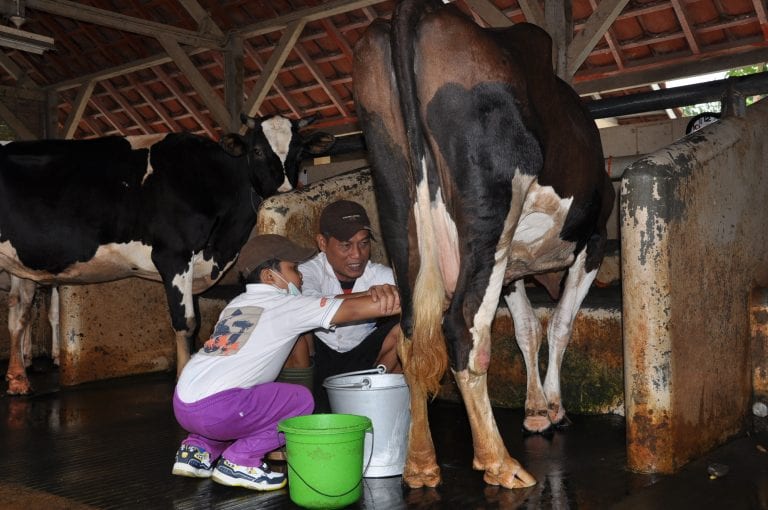
During its 75 years of independence, Indonesia has made various efforts to achieve one of its goals, namely the intellectual life of the nation and advancing the general welfare. The state is committed so that its citizens can get a proper education and fulfill the people’s welfare in terms of food, shelter and clothing.
“However, the country still has homework in achieving these goals. The incidence of stunting (short children under five) is a major nutritional problem in Indonesia. Stunting not only has the potential to affect children’s health, but also their level of intelligence. According to WHO data, the average prevalence of stunting under five in Indonesia in 2005-2017 is 36.4%. Indonesia is the third country with the highest prevalence of stunting in Southeast Asia, said the Dean of the Faculty of Animal Science UGM, Prof. Dr. Ir. Ali Agus, DAA., DEA., IPU., ASEAN. Eng when contacted on Saturday (15/8).
The Dean added that President Jokowi in a limited meeting of “Accelerating Stunting Reduction” on August 5, 2020, said that in 2013 the prevalence of stunting was 37% to 27.6% in 2019. However, this decline is not enough, the President is targeting the prevalence of stunting in 2024 to be 14%. Eggs are one of the livestock products that have a potential surplus of production compared to meat and milk. In 2018, egg production was 1,756,691 tons or 101.5 percent of the national need of 1,730,550 tons (JPPN, 2019).
“Eggs that are naturally prepared to become candidates for a new life contain complete nutrition. In terms of price and production method, eggs are also more affordable to the public than meat and milk. Moreover, the nutritional content of eggs can also be modified by engineering the feed (herbal eggs, functional eggs, omega eggs, etc.). Therefore, independence (read self-sufficiency) of this national egg production can be capitalized to bring this country to the freedom from stunting. The movement for Indonesia Laying Eggs (egg production & eating eggs) at various ages and social strata of society becomes the means,” the Dean explained.
Fulfillment of national nutrition is closely related to the role of the livestock sector as a provider of food for animal protein such as milk, eggs and meat. The IAARD said, until 2015, the consumption of animal protein in Indonesian society reached 21.8 grams per day, higher than the available one, which is 18.23 grams. This condition is an opportunity for the creation of various jobs in the livestock sector. Based on the national labor force survey (Sakernas) of the Indonesian Central Bureau of Statistics in August 2017, there were 3.84 workers in the livestock sector. This figure contributes 3.17 to the national workforce. The livestock sector is a prime mover in rural economics because it is still traditionally managed by rural farmers with low educational backgrounds. According to agricultural sector employment statistics, in August 2019, the population working in the livestock sub-sector with a background of basic education was 3.8 million people, secondary education was 557 thousand people, and tertiary education was 76 thousand people.
“By looking at these conditions, before the 75th anniversary of Indonesia’s independence, it is necessary to increase superior human resources in the field of livestock. In the current industrial era 4.0, superior human resources are closely related to mastery of technology. Animal science graduates are expected to be sensitive and adaptive to technological developments so that they can bring progress in the field of livestock, including creating jobs. Especially during the Covid-19 pandemic, there was a very drastic change that required competent and skilled animal science graduates,” the Dean said.
Higher education is an institution that plays a major role in producing superior human resources in the field of livestock. Currently, learning animal science in tertiary institutions is associated with the industrial world with modern technology as a producer of high quality food, such as eggs, meat and milk which are needed by the community. Higher education institutions are currently required to partner with industry to pursue the gap between the industrial world and universities.
The inauguration of the new Director General of Livestock and Animal Health is a momentum to answer the fulfillment of nutritious food that can reduce the prevalence of stunting in Indonesia. According to the 2014 Individual Food Consumption Survey data, Indonesian children aged 6 months and over consume cereals by 95%, this figure is very far from the consumption of protein, fruit and vegetables. Therefore, the government is expected to be able to provide highly nutritious food to create food security down to the family level which is an important aspect of preventing stunting.
In addition, the government is expected to be able to create jobs, especially in the field of livestock for the welfare of the community. In the situation of the Covid-19 pandemic, the economic sector that grew was the agro sector, which was 2.51% while the other sectors were -5.3%. This means that agro is the savior of the national economy because it is local based. Farmers make use of available local resources with knowledge that has been practiced over the years to produce quality food for the community
